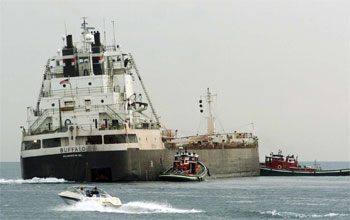An ore carrier ran aground in Lake Huron after it declutched in a tight space while approaching the St. Clair River.
The American Steamship Co. lake freighter Buffalo, ran aground at approximately 2130 on Aug. 1 in Lower Lake Huron, near the entrance to the river on the Canadian side of the lake about a mile from Sarnia, Ontario.
The 634-foot lake freighter laden with iron ore pellets was bound for Cleveland when both main engines of the vessel declutched. The ship then lost power to its propeller and grounded in mud near buoy 2 in the approach to the St. Clair River.
Transportation Safety Board of Canada (TSB) investigator Capt. Wendy Jolliffe described the currents in the area as “wicked.” Vessels must exercise extreme caution in the area as indicated in this occurrence, Jolliffe said.
“The engines were only declutched for about a minute, but the vessel was in tight quarters and the current pushed her very quickly. There was really very little time to react. Since the propeller was stopped, the actions of the rudder were ineffective. Basically, the vessel was unable to make the required turn into the (river),” Jolliffe said. “With a strong following current (normally about 6 to 8 knots) and no way to steer, the vessel was onto the mud bank in seconds.”
U.S. Coast Guard Sector Detroit received a report from the bulk carrier captain at 2200 stating the vessel ran aground while transiting south to Cleveland. A rescue boat crew from Station Port Huron, Mich., launched aboard a 41-foot utility boat. The Coast Guard advised the ship not to maneuver due to a 10- to 15-foot lift on the port side of the vessel.
Three TSB investigators boarded Buffalo.
“We spoke with many of the crew, looked at the engine room and reviewed the log books,” Joliffe said. “We were aboard when the damage assessment was completed and they were clear to go within a few hours.”
A refloat plan was approved through Transport Canada and the U.S. Coast Guard before attempts were made to move the vessel. The joint inspection found that the vessel, although aground, had stabilized. The propulsion, steering and other navigational systems were functioning. There were no injuries, damage, pollution or ingress of water.
Two tugboats, Idaho and Wyoming, from Great Lakes Towing in Detroit, arrived at the scene at about 1100 on Aug. 2. It took about one hour of tugboat work, in conjunction with the vessel’s propulsion and thruster, for the vessel to be freed.
Transport Canada found no grounds for enforcement measures. American Steamship Co. did not respond to several requests for comment.
Because there was no damage, injuries or pollution, Joliffe said the TSB is not producing a written report.

